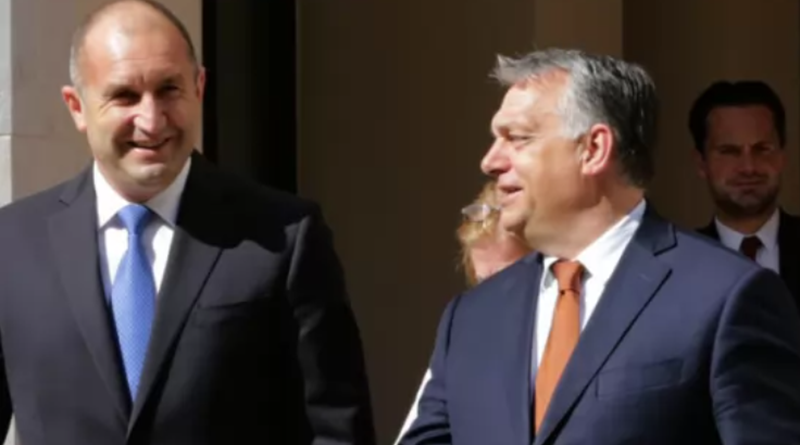Shadow Schemes: The Transshipment of Russian Crude Oil in Bulgaria
Orbán Takes Over Lukoil’s Assets in Bulgaria?
In late November, an investigation by Ukrainska Pravda featured on The Alternativata TV show exposed suspicious transshipment activities in Burgas Bay. Footage from the investigation revealed crude oil being transferred between tankers under the watch of Bulgarian authorities. This process, often justified as transferring oil from a larger tanker (around 100,000 tons) to a smaller one (70,000–80,000 tons) capable of docking at Rosenets, raises significant questions. Both ships in the video—the Liberian-flagged Lipari (80,000 tons) and the Maltese-flagged Stamos (61,000 tons)—can already access Rosenets, undermining the purported logistic rationale for the operation.

Investigation Findings
The presence of a tugboat in Burgas, as highlighted in the above snapshot in the investigation by Ukrainska Pravda, strongly suggests that these operations occur with the consent of Bulgarian authorities. One plausible explanation is that the Lipari belongs to Russia’s expanding shadow fleet, created to evade sanctions. Reports indicate this fleet grows monthly to recover ‘losses’ in expanding list of sanctions ships. Alternatively, the Lipari may lack valid European insurance, instead relying on Russian-issued coverage, which is largely unusable. Another possibility involves oil certificates rebranding Russian oil as KEBKO (Kazakh Export Blend Crude Oil) to bypass restrictions.
Such activities likely certainly enjoy the tacit approval of Glavchev’s caretaker government, influenced by Peevski and Borisov. Official customs and port authorities, along with SANS (the State Agency for National Security) and prosecutors, are unlikely to identify wrongdoing, as documentation ostensibly confirms ‘on paper’ the oil’s non-Russian origin. However, uncovering such schemes requires determined investigative efforts, which appear absent.
Political Context and Corruption
Interestingly, Borisov and Peevski, who previously criticized Kiril Petkov’s cabinet for importing Russian oil and retaining derogations, are now silent—possibly because they benefit from these operations. Each shipment of crude oil, valued at approximately $35 million, represents significant political leverage for intermediaries. This context likely explains the arrest of Stella Banova, former head of the Customs General Directorate, and the reinstatement of certain customs officials.
Bulgarian authorities likely possess even more detailed intelligence than Ukrainian journalists. However, the financial flows generated by these sanction-evasion schemes continue to fuel corruption and bolster Russia’s influence in Bulgaria. It is no coincidence that Glavchev’s government has declined to sign the bilateral security agreement with Ukraine, distancing Bulgaria from the solidarity group of 25 EU member states with similar agreements. Instead, Bulgaria appears aligned with the policies of Viktor Orbán and Robert Fico, joining a less cooperative bloc.
In stark contrast, Romania actively exposes and prosecutes Russian agents, taking decisive action against malign influences. Meanwhile, Bulgarian counterintelligence and financial authorities remain conspicuously silent. Should Romanian authorities trace Russian oil routes to Constanta, they might uncover connections to political outcomes—a dynamic that seems to be replicated in Bulgaria.
Lukoil’s Asset Sale and Regional Implications
Meanwhile, the sale of Lukoil’s Bulgarian assets—including the largest oil refinery in the Balkans, located in Burgas—continues. Political maneuvering appears to facilitate Hungarian MOL’s acquisition. A potential deal to transfer these assets may involve Russian controlled financing, relying on Hungary to secure EU regulatory approval. Viktor Orbán’s recent visit to Bulgaria likely aimed to coordinate government support with President Radev and GERB leader Borisov.
However, MOL’s limited financial resources, as evident from its recent financial statements, cast doubt on its ability to independently manage the Burgas refinery. This raises suspicions about MOL’s reliance on Russian backing. These opaque schemes, coupled with Bulgaria’s sanction exemptions, undermine international efforts to restrict Kremlin aggression against Ukraine. Orbán, a staunchly pro-Russian EU politician, epitomizes the undermining of EU sanctions policies designed to maintain unity against Moscow’s expansionist ambitions.
Conclusion
The unfolding shadow schemes in Bulgaria reflect a troubling nexus of corruption, geopolitical maneuvering, and sanction evasion. Transshipment activities in Burgas Bay and the potential Russian-backed acquisition of Lukoil assets by MOL demonstrate how regional actors exploit regulatory gaps to bolster Kremlin interests. As financial flows from these activities strengthen Russian influence in Europe, the failure of Bulgarian authorities to act decisively stands in stark contrast to Romania’s proactive stance. If unchecked, these schemes risk undermining the collective efforts of the EU and its allies to curtail Russian aggression, making Bulgaria a critical weak link in the broader sanctions regime. Addressing this requires greater transparency, accountability, and alignment with EU policies to prevent further erosion of sanctions and to safeguard regional stability.
Ilian Vassilev




